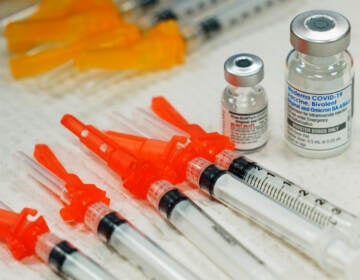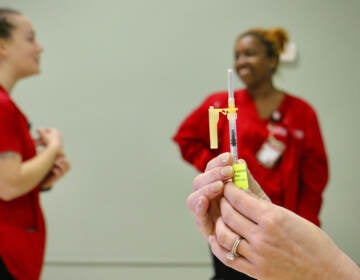When will it be your turn to get the coronavirus vaccine? Here’s a guide
It’s hard to pin down a specific answer for any one person. WHYY’s Health Desk Help Desk created this interactive way to figure out where you stand.
Listen 4:47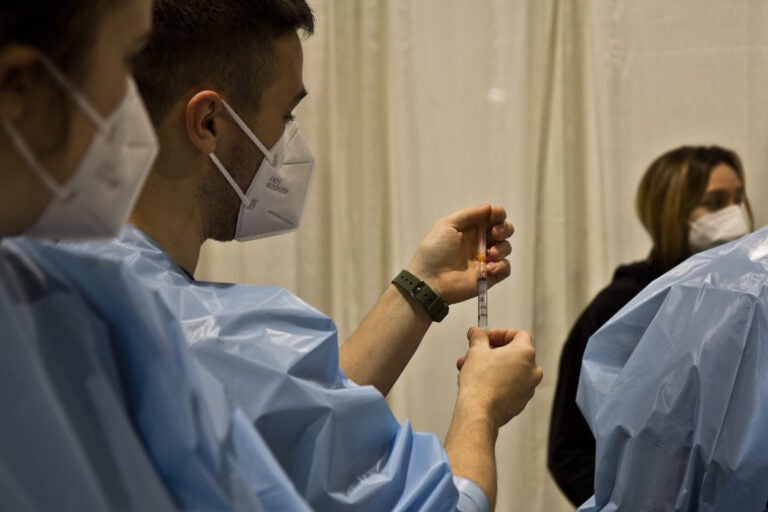
A nurse trains others on how to administer a COVID-19 vaccination at Philly Fighting COVID's vaccination clinic at the Pennsylvania Convention Center on Jan. 8, 2021. (Kimberly Paynter/WHYY)
Updated: Apr. 19, 2021
Thousands of COVID-19 vaccine doses have already been administered throughout the region, despite widespread delays in federal rollout and local distribution. Thousands more are on their way. And with the holidays over, officials say, vaccination efforts are expected to ramp up.
So we’re all wondering: When will it be my turn?
WHYY’s Health Desk Help Desk has fielded dozens of questions about when individual readers and listeners can expect to be eligible for the vaccine. It’s hard to pin down a specific answer for any one person because of overlapping priority groups, changing state guidance in Pennsylvania, New Jersey and Delaware, and the aforementioned vaccine delays. But here’s an interactive guide that might help you determine the answer.
Starting April 19, all residents in Pennsylvania, New Jersey, and Delaware are eligible for the COVID-19 vaccine.
Answer the following questions by clicking each link for yes or no. Each link will either send you to your result or to the next question.
When will you be eligible for the coronavirus vaccine?

Question 1
Are you a health care worker (hospital, urgent care, health center or clinic, long-term care facility, dental, pharmacy, emergency services, etc.)?
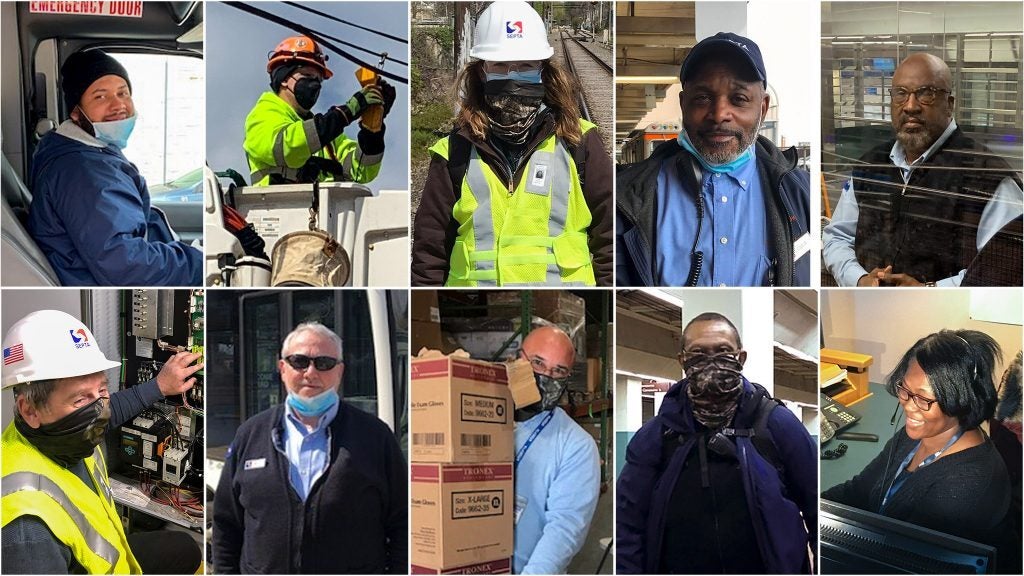
Question 2
Are you an essential worker, as designated by your state? If yes, are you working in a critical infrastructure industry with high risk of exposure, such as food processing, education, public transportation, police and fire, etc.?
- Yes, in a high risk or critical infrastructure industry >>
- Yes, but not in a high risk or critical infrastructure industry >>
- No, I’m not >>
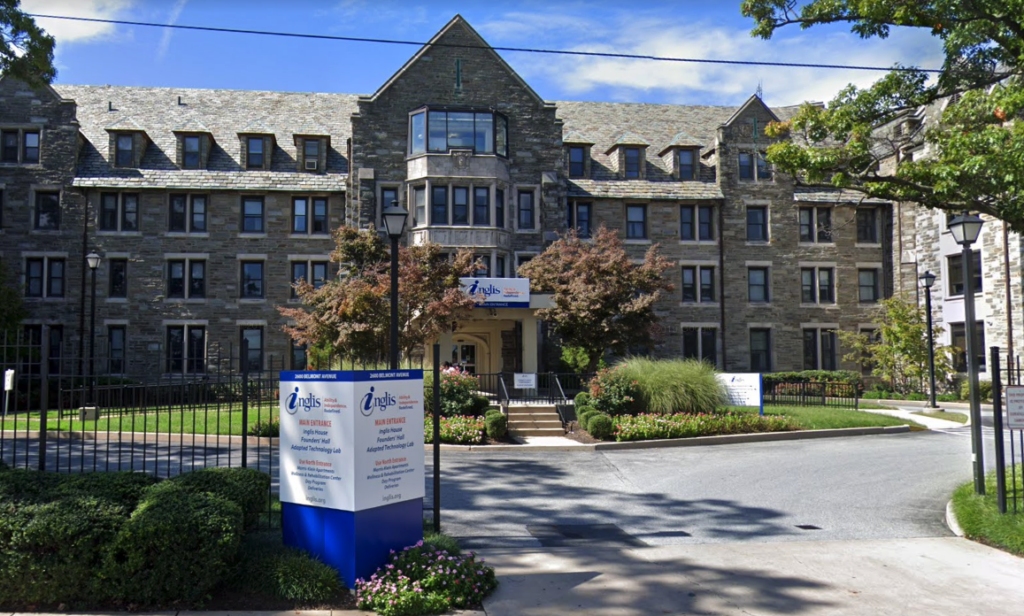
Question 3
Are you currently living in a long-term care facility (e.g. a nursing home)?

Question 4
Are you 65 or older? (If you live in Delaware, are you 50 or older?)
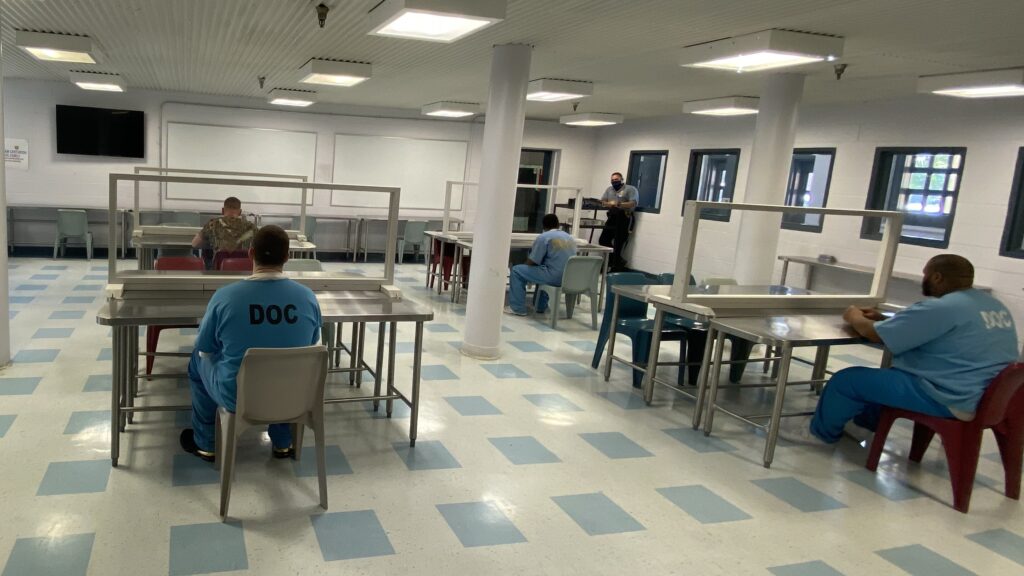
Question 5
Are you currently living in a congregate setting (e.g. homeless shelter, correctional facility, detention center, group home, etc)?

Question 6
Are you immunocompromised, and/or do you have any chronic or underlying medical conditions (cancer, diabetes, COPD, severe obesity, sickle cell, lung/heart/kidney disease, etc.)? If you live in Philadelphia, do you have an intellectual disability and/or are you taking immunosuppressant medication?
Results: Which vaccine group are you in?
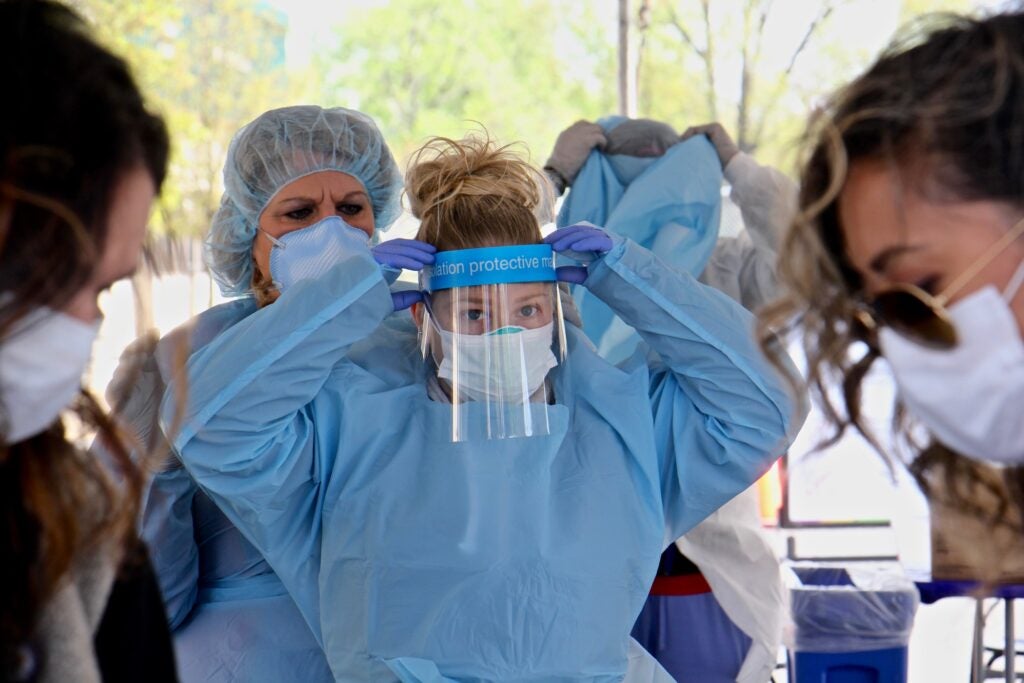
Health care worker
Del. phase 1A, N.J. phase 1A, Pa. phase 1A, Philadelphia phase 1A
Good news: As a health care worker, you’re among those prioritized to get the vaccine; the first round of vaccinations began in hospitals around the region in December. That said, each hospital is receiving a limited amount of doses, and most are prioritizing those with the highest risk of direct exposure to COVID (e.g. emergency and COVID unit workers). You’re currently eligible for the shot; if you aren’t already vaccinated, your best bet for finding out when you’ll get the vaccine is to check directly with your place of work.
Get more information about the vaccine timeline.
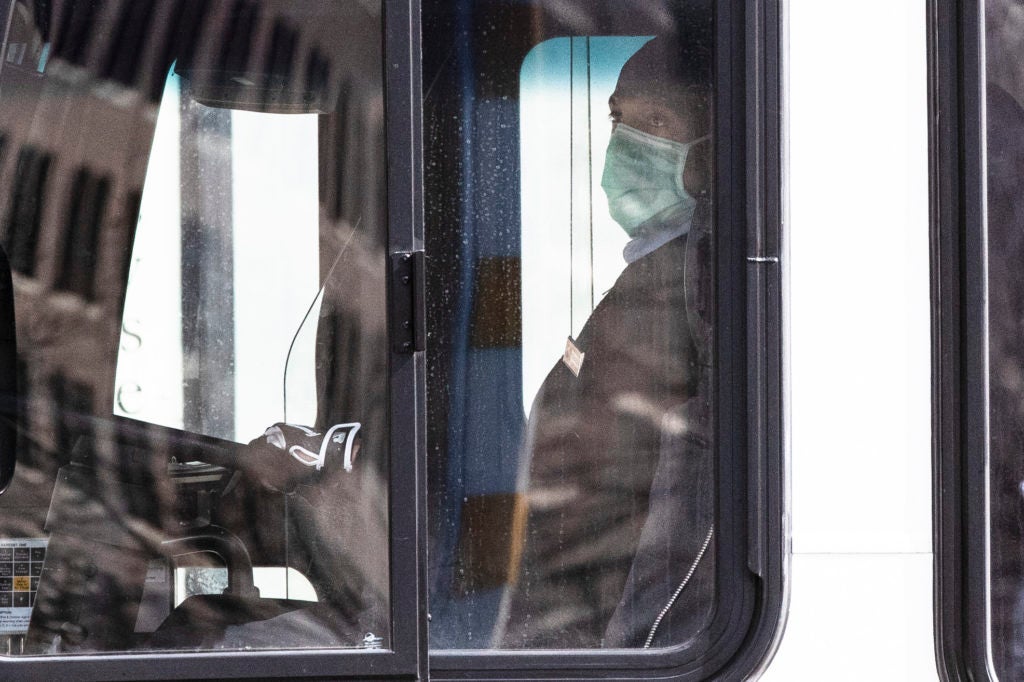
Essential worker – Critical
Del. phase 1B, N.J. phase 1B, Pa. phase 1B, Philadelphia phase 1B and 1C
As an essential worker in a critical infrastructure industry who may be routinely exposed to COVID-19 on the job, you’re within the second group of the first phase of vaccine distribution.
Not sure whether you’re an essential worker, or whether your industry is considered part of critical infrastructure? Priority groups may still be subject to change, but in the meantime you can consult your state’s guidance: Officials are still finalizing the groups for each phase, but in the meantime, you can consult your state’s guidance here: Delaware, New Jersey, Pennsylvania (Philadelphia, which has separate guidance from the rest of the state, has worker priority groups listed here).
Get more information about the vaccine timeline.
Resident in long-term care
Del. phase 1A, N.J. phase 1A, Pa. phase 1A, Philadelphia phase 1A
As a resident of a nursing home or long-term care facility, you’re also in the early phase of vaccine distribution in the region. In all three states and in Philadelphia, your phase is already eligible and currently being vaccinated. (In Delaware, distribution to long-term care facilities began Dec 17; In Pennsylvania and New Jersey, vaccination of staff and residents at long-term care facilities began Dec 28.)
Get more information about the vaccine timeline.
Priority population: Elderly
Del. phase 1B (for those 50+), N.J. phase 1B, Pa. phase 1A, Philadelphia phase 1B
As someone age 65 or older and therefore more vulnerable to severe effects of COVID-19, you’re prioritized in the first phase, after health care workers and long-term care facility residents and alongside many frontline essential workers and immunocompromised people. In all three states and in Philadelphia, your phase is already eligible and currently being vaccinated. That doesn’t mean you’ll get your shot right away — doses are still limited in multiple counties, and vaccine sign-ups can be difficult to navigate — but you’re a top priority.
In Pennsylvania, Gov. Wolf promised every resident currently eligible for vaccination in group 1A will be able to make an appointment by the end of March. In Delaware, officials are working to finish vaccinating everyone 65 and older; by the end of March, mass vaccination sites and pharmacies expanded to cover those 50 and older. In New Jersey, where Phase 1B continues to expand, advocates are asking officials to build vaccine signup infrastructure so that older residents are not left behind.
Get more information about the vaccine timeline.
Priority population: Immunocompromised person, congregate settings
Del. phase 1C, N.J. phases 1B (for immunocompromised) and 1A (for high risk congregate settings), PA phase 1A (for those with high risk medical conditions), and 1B (for congregate settings), Philadelphia phase 1B
As someone within a critical population — immunocompromised, with certain high-risk medical conditions, or living in a congregate setting — you’re a high priority for the vaccine. In all three states and in Philadelphia, your phase is already eligible and currently being vaccinated.
In Delaware, as of March 17, those age 16-64 with certain medical conditions are now eligible for the vaccine. In New Jersey, these immunocompromised groups are eligible as well. And In Pennsylvania, Gov. Wolf has promised every resident currently eligible for vaccination in group 1A — which includes those with high and moderate risk medical conditions — will be able to make an appointment by the end of March.
Get more information about the vaccine timeline.
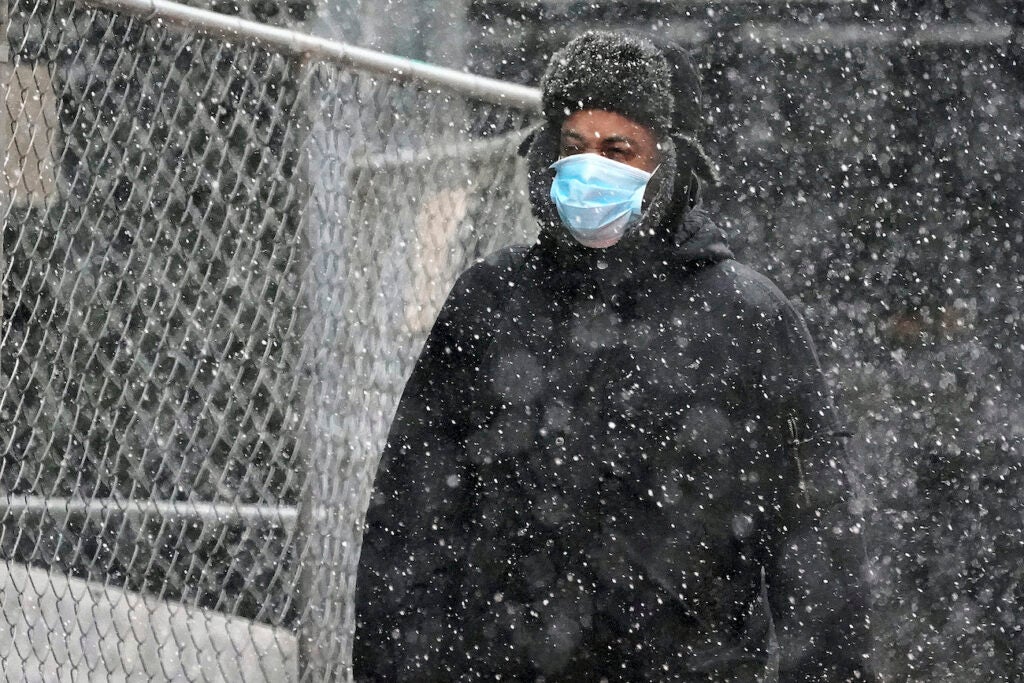
Essential worker – Non-critical
Del. phases 1C and 2, N.J. phase 1C, Pa. phase 1B and 1C, Philadelphia phase 1C
As an essential worker, but not one working in a critical infrastructure industry routinely exposed to COVID, your risk of exposure to coronavirus isn’t as high. You’re currently eligible for the COVID vaccine.
In Delaware, some non-critical essential workers — including food service, transportation, construction, energy, and others — are eligible to be vaccinated through their employers; all other workers are eligible April 6, along with the general public. In Pennsylvania, essential workers including firefighters, law enforcement officers, grocery store staff, as well as people working in food manufacturing and agriculture are also currently eligible; additional workers in Phase 1B became eligible starting April 6, and in 1C starting April 12. In New Jersey many non-critical essential workers are already eligible for the vaccine, including those who work in public safety, transportation, food agriculture and production, social services, and more; the rest will become eligible by April 19. And in Philadelphia, most non-critical essential workers will become eligible in Phase 1C by April 12, while the rest will become eligible along with the general public April 19.
*Note: Depending on your state or city, if you are immunocompromised with chronic or underlying medical conditions that put you at increased risk for severe symptoms of COVID-19 (cancer, diabetes, COPD, severe obesity, sickle cell, lung/heart/kidney disease, etc.), or if you are living in a high-risk congregate setting like a group home or correctional facility, you may qualify for an earlier phase.
Not sure whether you’re an essential worker, or whether your industry is considered part of critical infrastructure? Priority groups may still be subject to change, but in the meantime you can consult your state’s guidance: Delaware, New Jersey, Pennsylvania (Philadelphia, which has separate guidance from the rest of the state, has worker priority groups listed here).
Get more information about the vaccine timeline.

Everyone else
Del. phases 2 and 3, N.J. phase 2, Pa. phase 2, Philadelphia phase 2
As a member of the general public, you aren’t at highest risk for COVID-19 — which also means that you aren’t within the first few priority groups for vaccinations. You’re currently eligible for the vaccine. In Delaware and Pennsylvania — including Philadelphia — eligibility is currently open to all residents 16 and older. In New Jersey, eligibility opened to all residents 16 and older starting April 19.
In the meantime, you should keep taking measures to protect yourself and loved ones from the virus. That means wearing masks, avoiding indoor gatherings, and maintaining handwashing and physical distancing whenever possible.
Scroll down for more information about the vaccine timeline.
More answers to your questions
Why don’t we have a more specific timeline?
Previously, states were hesitant to provide specific dates or even months for each stage of the vaccination process. That’s partly because it’s highly dependent on the quantity of vaccine doses that becomes available, and when. President Biden has promised that the country will have produced enough vaccine doses for every adult in America by the end of May, but several states have reported delays and decreases in their shipments, and currently there’s no publicly available data on how much is being sent to each state.
But as we move into the summer, officials have been more decisive about vaccine rollout timelines. Delaware recently announced that all residents over the age of 16 will be eligible for the vaccine starting April 6. New Jersey’s governor followed with the news that all residents over the age of 16 will be eligible for the vaccine starting April 19. Both Philadelphia and Pennsylvania are on an accelerated rollout schedule that will also open up eligibility to the general public starting April 19.
This could be subject to change. Here’s why.
States’ vaccine distribution plans are dependent on Centers for Disease Control and Prevention recommendations…but the CDC has continued to issue new rollout recommendations as the science evolves, and will probably issue more in the future released a new recommendation on vaccine priority groups, and will probably issue more in the future. We can expect state officials to change their guidance accordingly.
FOR OTHER INFORMATION …
… about whether (and where) you’ll be able to sign up to receive the vaccine
At the beginning of the vaccine rollout, when vaccines were primarily available to health care workers and residents and staff in long-term care facilities and not yet to high-risk members of the general public, statewide vaccine sign-up systems were few and far between. That’s not the case now.
Individuals eligible in Delaware can sign up to receive the vaccine from pharmacies, vaccination events, or medical providers, although pharmacy sign-up and mass vaccination event registration is currently available only to phase 1A individuals (health care workers and long-term care facility residents and staff) and those 65 and older.
Still confused or need more help? Here’s more information about where to sign up for the coronavirus vaccine in Delaware.
Pennsylvania currently has no statewide vaccine sign-up system. Instead, each county has a sign-up system, and each system works slightly differently. And Philadelphia, which receives vaccines directly from the federal government, has an entirely separate vaccine prioritization strategy from the rest of Pennsylvania.
Still confused, need more help, or looking for county-specific sign-up information? Here’s more information about where to sign up for the coronavirus vaccine in Philadelphia and the rest of Pennsylvania.
In New Jersey, individuals can pre-register and make appointments online through the statewide NJ Vaccine Scheduling System. For those without computer or internet access, New Jersey’s vaccination hotline, 1-855-568-0545, is available from 8 a.m. to 8 p.m. every day and can help callers in more than 240 different languages.
Still confused or need more help with county-specific sign-up information? Here’s more information about where to sign up for the coronavirus vaccine in New Jersey.
… about the difference between the Pfizer, Moderna, and Johnson & Johnson vaccines
The short answer is that a) the Pfizer vaccine needs to be kept at colder temperatures than the Moderna vaccine, meaning it’s more difficult to ship and store, and b) Moderna’s shots must be administered 28 days apart, while Pfizer’s shots only need to be 21 days apart. Both have an efficacy rate of close to 95%. Philly Voice has more details.
The Johnson & Johnson vaccine, which is not an mRNA vaccine like the other two, doesn’t need to be kept at ultra-cold temperatures and is effective after only one dose. It has an efficacy rate of 66%, but it’s still excellent at preventing severe sickness and death. We explain more about the science behind the J&J vaccine here.
In the long run, experts say, you shouldn’t get too caught up in the details and differences between the vaccine; they’re all highly effective, which means the best vaccine for you is the one you can get right now.
… about the efficacy of the vaccine, and concerns that it’s been “rushed”
As WHYY News reporter Nina Feldman explains here, the vaccine hasn’t been rushed — the technology for an mRNA vaccine has existed for a while. But a federal agency partnership called Operation Warp Speed helped to fund research and trials, which made the development process faster than it’s ever been. Plus, this pandemic has spread incredibly quickly across the nation, and, well, more infections equal faster research.
… about the vaccine’s side effects
… about what health care workers getting the vaccine have to say
… about testing and travel for the holidays or an event
Still have questions about COVID-19 and the vaccine rollout? Get in touch with us here.

Get daily updates from WHYY News!
WHYY is your source for fact-based, in-depth journalism and information. As a nonprofit organization, we rely on financial support from readers like you. Please give today.






![CoronavirusPandemic_1024x512[1]](https://whyy.org/wp-content/uploads/2020/03/CoronavirusPandemic_1024x5121-300x150.jpg)
